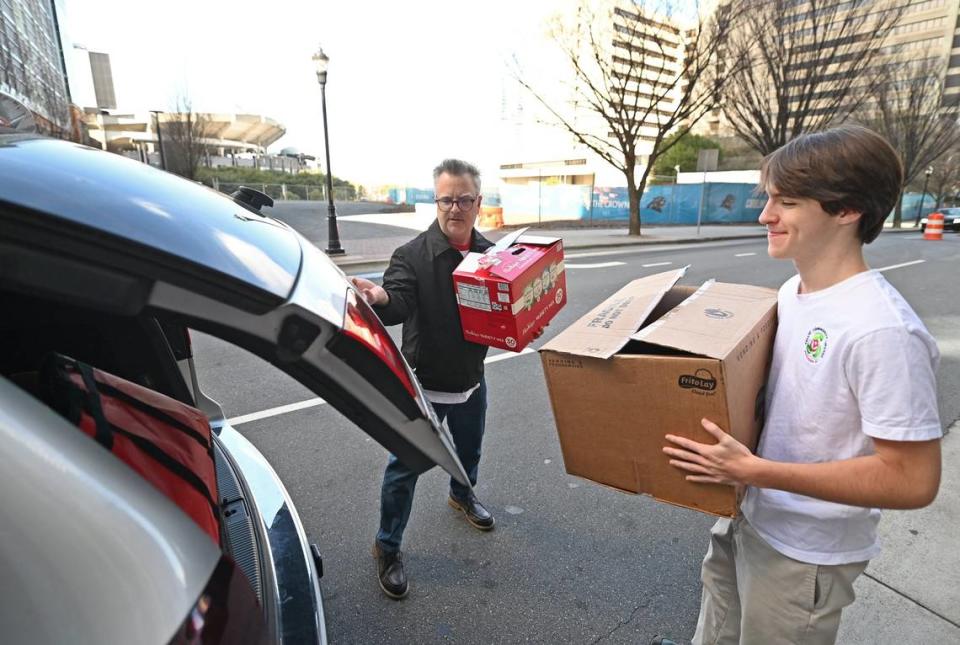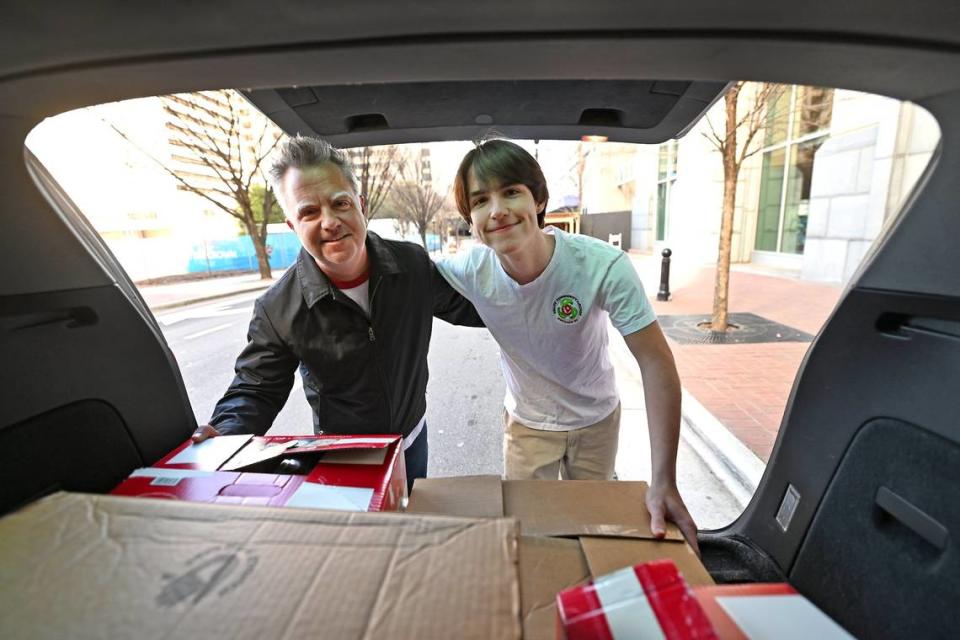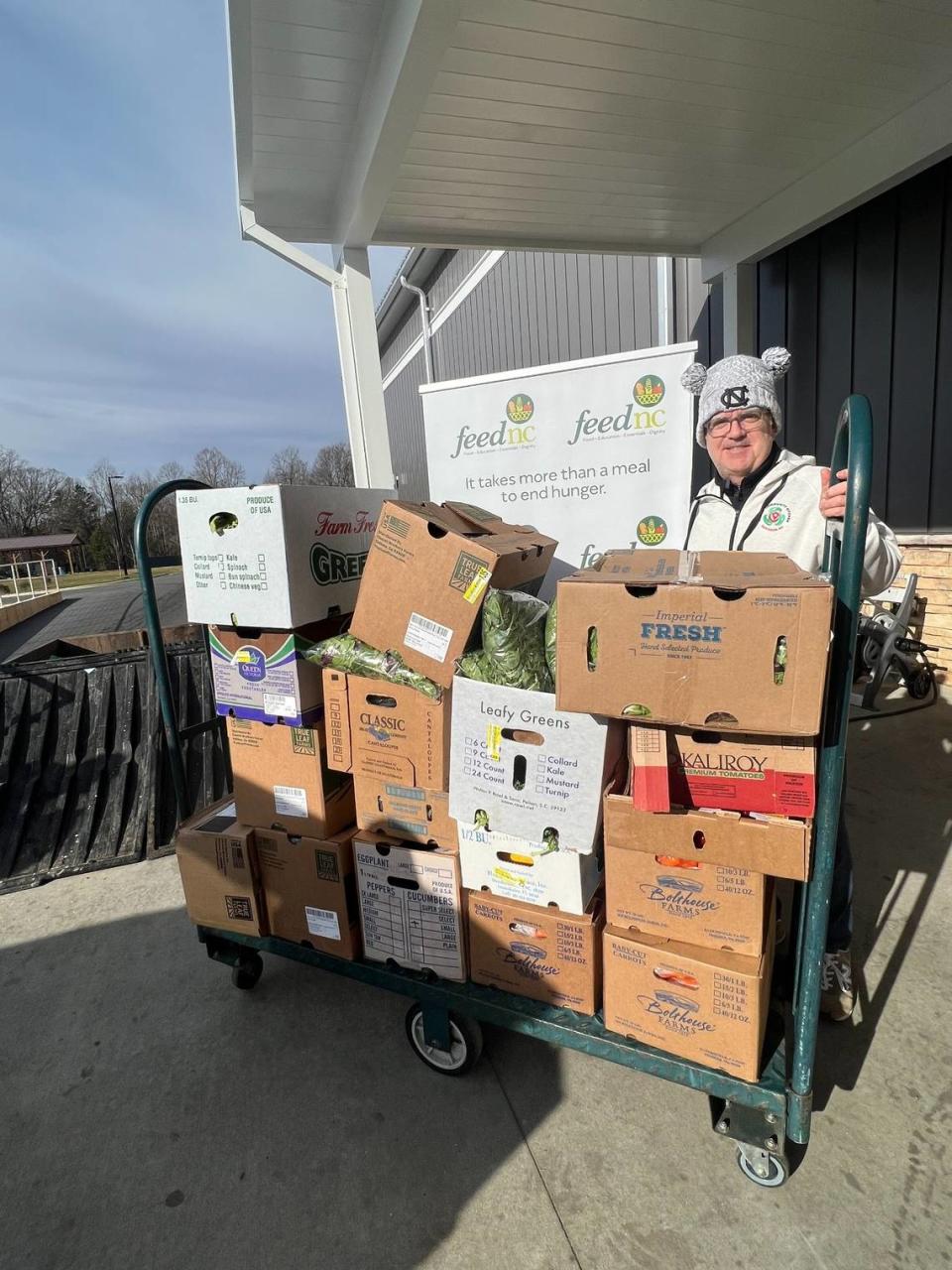A son’s school project rescued food. Now that he’s in college, can Dad keep it alive?
Prompted by a single question about Kellys’ Community Kitchen — the nonprofit organization he created with his older son (sort of) and now runs with his younger son (kind of) — Brendan Kelly can talk nonstop for half an hour straight.
The 50-year-old Davidson resident will talk about their efforts to normalize the conversation around rescuing food. He’ll talk about all the relationships they’ve made with organizations that have leftover food and organizations that provide pipelines into the hungry mouths. He’ll talk about how, despite appearances, he’s not trying to draw attention to himself and his family; about how he’s just trying to draw attention to the high rate of food insecurity.
And he’ll do all of this talking seemingly without taking a breath.
But when asked for a simple elevator-pitch explaining why he dedicates so much of the free time he has away from his day job at Bank of America to tackling the issue of food waste, Kelly can sum it up pretty succinctly.
Think of it this way, he says: “At your house, if you don’t eat all of something you cook, if it’s still good, you put it in Tupperware. Then maybe you eat it later. Or maybe you don’t. But you don’t immediately just throw it out. You try to use it for something. Even if you ultimately wind up just throwing it out. ...
“When this happens at a commercial level? There is just, like, massive opportunity there.”
So, in the four years since Brendan Kelly helped his elder son Aiden brainstorm an idea for the school project that would evolve into Kellys’ Community Kitchen, they’ve gained surprising traction. For instance, they have official partnerships with UNC Charlotte and its food-service provider Chartwells Higher Ed (which is part of Compass Group) — among others — for pickups of excess pre-prepared food, as well as with FeedNC — among others — for drop-offs of that food.
But without any significant funding, nor any support staff outside of the family, can this ever be much more than just a very ambitious pet project?

‘Build something that has impact’
At the beginning of 2020, Aiden Kelly — then a high-school sophomore at Pine Lake Preparatory in Mooresville — was trying to come up with a service project that might connect to potential future career opportunities.
Whether he actually asked his dad for the advice could be debated, but needless to say, Brendan Kelly was happy to give some.
“Why don’t you build something that has impact?” Brendan urged his son. “Something lasting.” He and his younger brother had it pretty good, Dad told him. He strongly suggested Aiden come up with an idea that would serve as a constant reminder that there were people out there who did not.
Aiden ultimately decided he wanted to do something food-related, largely because the Kellys cook together a lot and had watched a lot of the Food Network together.
But he didn’t find the proper inspiration for what that would be until one day when they were driving around the back of the country club in their neighborhood and spied a dumpster that was overflowing with bunches of discarded food.
“Aiden said, ’What a waste.’ I said, ‘You don’t know the half of it,’” recalls Brendan, who says he then explained to his son how he put himself through the University of North Carolina by working in restaurant kitchens all over Chapel Hill.
“And he was kind of intrigued by that. So we’re like, ‘OK, maybe there’s something there.’”
At first, they dreamed up an idea for getting the country club to allow them to take home its food waste so they could cook it up into something that could be put into deli cups and distributed to people experiencing homelessness in the former “Tent City” near uptown. By this point, Aiden’s younger brother Liam (then an eighth-grader) was taking an interest in helping.
It took some persistence and some convincing, but eventually the club’s general manager caved. He told the Kellys he’d never heard of anything like their idea before. He also thought it seemed a little weird. But he said they seemed like good people, so he was willing to take a chance on them. All they had to do, he told them, was become a 501(c)(3) — because doing so would protect the club from liability if food it donated happened to make someone sick.
“Look, I just want to have some fun with the kids, and cook some stews, and do some good, and have some life lessons,” Brendan told the GM. “Yeah,” the guy responded. “I mean, it’s not gonna be that simple.” The Kellys were pretty married to the idea at this point, though. So they started the 501(c)(3) application process. But just about when they were ready to roll, the pandemic began.
And the GM suddenly had much greater concerns than launching an untested new program: “It is not,” he told them, “the time.”
Hitting paydirt with UNC Charlotte
Brendan accepted the reversal of the decision. He did not, however, want his sons to lose their momentum, and pushed them to look for other possible donors.
Like their neighborhood country club, the restaurants they approached didn’t want to get involved because their owners weren’t even sure they’d still be in business in a week. So they kept putting their heads together, and eventually wound up focusing on trying to forge partnerships with colleges, to collect food from their dining halls that was being thrown away despite still being perfectly edible. Colleges, after all, had dining halls that needed to stay open to serve out-of-area students who were sticking it out in their residence halls.
It was a slow start. The Kellys were respectfully declined by two Charlotte-area colleges, and had to jump through all kinds of hoops to get small-scale partnerships going with Belmont Abbey and Catawba colleges.
Finally, they hit paydirt, with UNC Charlotte. But they had to shift their perspective abruptly in order to come to an agreement with the 49ers. After the school’s sustainability coordinator vetted them, Brendan says, she called to start formulating a plan and asked: “How big is your vehicle, and how often can you come?”
“Wait a minute. We’re just trying to pick up a little excess,” Brendan replied, explaining that they just wanted to bring their excess home and find creative ways to cook it up into single-serve meals for the homeless.
She replied by saying that she was talking about leftovers. In other words, food pre-prepared for a cafeteria-style environment that had never actually made it in front of diners and — though it still was safe to eat — was marked for disposal because it was quote-unquote expired per their standards. (Think lasagnas, casseroles, stews, lo meins, fried rices, etc.)
She was thinking the Kellys could pick up the leftovers at one of their dining facilities, then simply transport the food in insulated coolers to organizations with missions to provide for people who couldn’t feed themselves. Essentially, they would be middlemen.
The problem was, this was never their plan. They were hoping to be chefs, of sorts, who would drive a carload of deli cups packed with their creations to “Tent City.” They had no idea, at this point, where they could even take these types of leftovers.
So they once again started making some calls, and — long story short — the Kellys were able to build up a Rolodex of organizations that would accept the food donations from them: The Salvation Army of Cabarrus and Stanly Counties’ Center of Hope emergency shelter in Concord; Charlotte Rescue Mission; and Mooresville-based FeedNC, among others.
But then in August 2022, Aiden himself headed off to college at Chapel Hill. And suddenly, three Kellys were just two.

‘Hopefully it doesn’t wither away’
Since then, over the past year and a half, Liam has worked to pick up the slack.
Brendan says last year they rescued about 4,200 pounds of food and turned them into an estimated 5,600 meals — by far the most ever in a year — and he credits their ability to do more with less in part to his younger son’s prowess at doing cost-benefit analyses. (For example, whereas Brendan would happily drive 45 miles round-trip for 20 pounds of food, Liam would argue that’s not the best use of their time).
Liam also got them in with sports teams, Brendan says, helping to forge a relationship with Charlotte FC that has turned the pro soccer club into their most frequent donor and a new one with Minor League Baseball’s Charlotte Knights on a pilot program.
In the meantime, the Kellys continue to try to grow the relationships with their other partners — the largest by volume being UNC Charlotte, its two dining halls, its grab-and-go markets and most recently its on-campus locations of Starbucks and Panda Express. The pickups, sometimes hundreds of pounds of food each, are weekly during the school year.
And the feedback is overwhelmingly positive.
“It’s fantastic,” says Allison Tietz, who inherited the relationship with the Kellys when she took over as sustainability coordinator for Compass Group at UNC Charlotte a year ago. “A lot of other campuses, they end up taking on the role as the middleman. ... When I tell my other peers at the other universities about Brendan, they say, ‘Man, I wish we had someone doing the legwork like this for us.’
“I’m like, ‘Yeah, it’s pretty nice.’”
Adds Lara Ingram, CEO of FeedNC, which primarily distributes the donated food to shut-ins: “It’s definitely meeting a need. I mean, the amount of food that is wasted in the United States every year is astronomical. ... And the amount of places that have food to rescue is probably just limitless, when you think about schools and hospitals and churches and then all the restaurants and all the businesses.”
The rub, of course, is that the Kellys’ capacity is limited to the time Brendan has away from his full-time job — and to the time Liam has away from being a full-time high school student. (Aiden is no longer involved at all, Dad says.)
The “company car” is his wife Andrea’s SUV. Brendan says about 95% of the operating costs are paid for out of his own pocket, with the other roughly 5% coming from Bank of America, which gives small grants to employees for certain numbers of volunteer hours. He’d love to grow this thing, apply for bigger grants, recruit some volunteers outside the family.
But in lieu of those things happening, he’s about to become a one-man band.
“When I go off to college later this year,” Liam says, “hopefully it keeps going. Hopefully, it doesn’t just die and wither away.”
The heart and soul of the operation
It certainly would be fair to wonder whether Aiden and Liam are really, truly are passionate about this project.
Liam wouldn’t blame you. “People are like, ‘Is it just a gimmick for you to get into college for an application?’
“I mean, it does help. It may make them look at you in a different light. But it’s not the reason that we did it. I like doing it. Makes me feel good. Makes my dad feel good. Makes my mom feel good. Makes my brother feel good. Makes anyone else that we’re contributing with, or partnering with feel good.”
At the same time, Liam spoke up only a few times during a conversation that ran more than two hours, while Aiden (despite being home) wasn’t interested in joining to give his input on the concept he helped create.
This is not to say Brendan’s sons haven’t played key roles in getting this project off the ground and keeping it there for four years.
But it is crystal-clear that the heart and the soul of Kellys’ Community Kitchen is their dad, Brendan, and equally clear that if anyone is going to keep it there for another four years — or 10, or 15, or 20 — it’s going to be Brendan.
“I think what people don’t understand is — to get a little emotional here,” Brendan says, as his eyes mist slightly, “— just the cycles of poverty and environmental situations that people are in. It’s not just about not eating, or eating crap food and you could get diabetes. There’s mental health issues. I mean, when you start to go to some of the same donors and you see the same people over and over, you can’t help but become invested in them. ...
“You just wonder what could it be like for longer-term mental health and emotional health if people didn’t have (issues with food insecurity) — if we could operationalize this thing that’s in our head and in our heart at a massive scale. And so then you go back to, ‘Ugh, how do we get more people to talk about this super-simple idea of food-cycling?’”
He shakes his head and frowns.
“Why more commercial enterprises don’t think about the opportunity that they’re just throwing in the dumpster every day — because it’s easier and they’re scared, frankly, of liability — is just plain stupid.”

-
For more information about Kellys’ Community Kitchen: kckdavidson.org.


